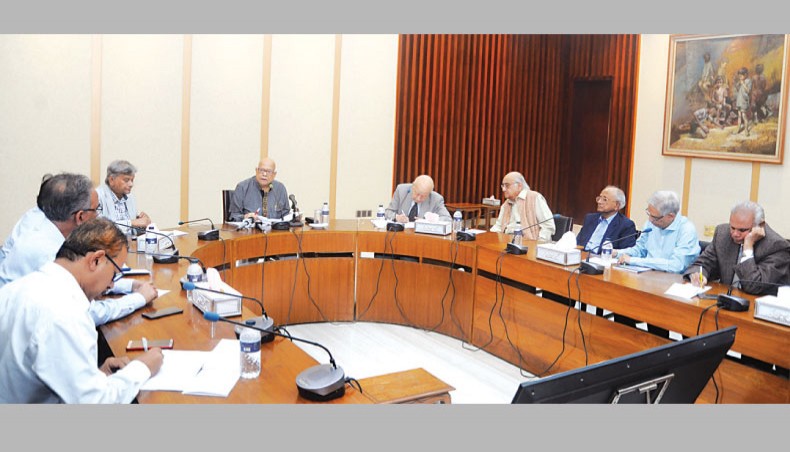Published in New Age on Tuesday, 13 March 2018
Introduce reforms in financial sector, budget implementation process
Economists suggest finance minister at a pre-budget meeting
Staff Correspondent

Economists and professionals on Monday strongly recommended that the government introduce enough legal and institutional reforms in the financial sector and budget implementation process to make its fiscal measures effective.
At a pre-budget discussion with finance minister Abul Maal Abdul Muhith, they also stressed effective monitoring of budget implementation and prevention of cost and time overrun of development projects to avoid risks of wastage of resources.
Centre for Policy Dialogue chairman Rehman Sobhan suggested going through the whole policy of the government and bringing qualitative changes in the economic management. Recommending strict measures against loan defaulters, he said that defaulting bank loans had been adopted as a business model by businesses in the country. Defaulters get loan rescheduling facility, which is a serious disadvantage for competitiveness in business, he observed. Parliament should follow up rescheduling of the bank loans during the parliamentary election period as defaulters get chance to contest elections through rescheduling their loans, he said. An alternative institutional arrangement is needed for long-term investment financing for the capital market, he said. Rehman also proposed introduction of penalty for cost and time overrun in implementation of development projects in the next budget.
Former finance minister M Saiduzzaman emphasised effective monitoring of infrastructure projects particularly those related to roads and highways and ensure quality of those projects.
Former Bangladesh Bank governor Mohammad Farashuddin advised the finance minister to undertake a study project to get an actual picture on unemployment situation in the country against the backdrop of growth in the number of jobless persons, which would become a major problem in future.
CPD distinguished fellow Mustafizur Rahman said that though the proposed size of the budget was necessary for Bangladesh, budgetary discipline including implementation was more important than a big-size budget. The government should take steps in the next budget to implement the pending reforms proposals like formulation of new customs act, direct tax act, civil service act, introduction of crop insurance and health insurance, among others.
CPD executive director Fahmida Khatun sought a policy statement on estimated fund for Rohingya refugees in coming years, source of fund and related issues in the budget documents. She also opposed the repeated recapitalisation of state-owned banks and private banks with public money. If Farmers Bank dies, let it dies, she said, adding that why the government would promote such organisation with public money.
CPD distinguished fellow Debapriya Bhattacharya suggested creation of a SDG trust fund for financing non-government organisations in implementing projects in health, education and other social sectors as the flow of funds to NGOs was shrinking due to a shift in priority of international donors. He also suggested addressing the issue of merger and acquisition of banks through framing a law in the next budget.
The first finance secretary of Bangladesh, Md Matiul Islam, recommended relaxing the limit of advance-deposit ratio for commercial banks considering the ongoing liquidity crisis at the financial market.
Muhith said that he would consider introducing penalty and reward system as appraisal of performance to remove time and cost overrun.
Regarding the banks’ ADR, he said that Bangladesh Bank had already relaxed the measure.
But, the message has yet to be reflected in the capital market.
In addition, there are some problems as some people are trying to fish in troubled waters.
Pointing out the recent developments over selecting DSE’s strategic partner from two consortiums from China and India, Muhith said the role of Dhaka Stock Exchange in this regard was not correct.
A resolution solving the problem will come by Thursday after the prime minister returns home, he said.
The finance minister said that the probable size of the budget for the next fiscal year of 2018-2019 would be Tk 4.75 lakh crore with the highest allocation for transport and energy sectors.
He said that the budget proposal would be placed before the parliament on June 7 and the parliament would pass the budget on June 30.
Former Agrani Bank chairman Khandaker Bazlul Haque and former finance secretaries Siddiqur Rahman and Mohammad Tareque spoke, among others, at the meeting.

